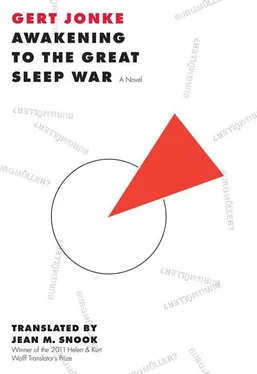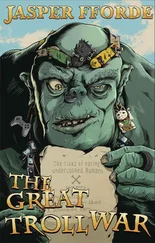No, but so much has happened since then, Burgmüller answered, so much that the great Herr Karl missed out on, and that is supposedly demonstrably the case, for example, with train tracks, people have stretched a giant net across all countries, on which, for example, all the regions and cities that are connected by it can exchange their buildings by throwing them at each other long-distance, as if they were reflected at each other on mirrors, yes, all those inventions, the steam engine, the sewing machine, the chaff cutter, the threshing machine, they were all invented after Herr Karl’s time, as was the typewriter too.
You said it yourself, she replied, invented, maybe not real at all, but only describable, without supporting evidence, and how is all that meant to testify against Herr Karl, how is it supposed to oppose him, what is there to be said against him?
I understand, he went on, that from the days of Herr Karl to today, right up until your time, things may not, indeed, have been correct anymore, that they might just have been, instead, the description of a vast labyrinthine gallery of mirrors that may have corresponded to, may still correspond to, the way Herr Karl saw things; but even if it’s true that Herr Karl didn’t die, no one knows that he’s still alive, so of what use is that to him, how can it be of service to him, to what end has he stuck around, did he love the time and place he lived in so much, and, at the same time, was he really so concerned about it, did he fear for it so much that he didn’t want anything to be forgotten, so that he could only permit himself to really live by decreeing that everyone else should describe everything around him more and more precisely, thus providing proof of it to him, because he was afraid he would otherwise lose the time and place he lived in, and would be forgotten with it, and thus he was forced to not let anyone else know anything about him, such that, in the end, perhaps it’s true that he really is still alive, yes, maybe you’re quite right, but what good does all that do him, what does he do with the countless reports and stories presented to him, clearly written as they are, and describing everything around him so precisely, he must be inundated by them. .?
I don’t know exactly, she said, but perhaps he uses those reports simply to have something to hold up to all the alternative worlds that might crop up to threaten him, and so to hand down, collected in his vast library, a depiction of his concept of “the past.”
And what’s this — the remains of some state holiday, who knows, perhaps in honor of Herr Karl? — because all the flagpoles along the streets had flags on them, there were even poles stuck in the skylights and windows of the buildings with joyfully, excitedly waving national rags.
Soon afterward, though, the flags seemed to have grown weary of the city, they came off, threw themselves into the arms of the wind that was coming up, and all of them together wafted out of the city on a fluttering tour through the country, the continent, and even out onto the open sea. For a while, this whole dense fluttering of national colors made the sky over the city blurry, and then the horizon, the air undulated in broad streams of national light and moved trembling out into the country, while the flagpoles that had been left alone hammered angrily on the rooftops, presumably lending very effective expression thereby to their desire to be hung with new flags, or was it a crude attempt to call off the exodus of the vanished flags, that desertion, to call back the cloth birds that had flown, to call them to order, to ask them to kindly hang themselves back up on their poles?
In vain.
But soon Burgmüller saw people clambering up the flagpoles to polish the sky over the city with new nationally colored cloths lashed up more firmly than their predecessors, so that once again, from the satisfied flagpoles, national dust rags waved joyfully, excitedly, high up over all the rooftops.
But the new flags didn’t hold out very much longer: they released themselves from their poles or the ends of their runners, got involved with the next good wind that was blowing up, wandered away with it far up into the high mountains, where most of them ran aground on the pointed chalky reefs, remained hanging there, wrapped themselves around the crosses on the mountain peaks, and then some of them were soon made use of by the national heraldic animals who lived there, eagles, vultures, bears, wolves, and others, in ways that were actually not at all contrary to their proper use, but that led right back to their origins, to make living quarters more comfortable, for example, as a comfortable bed in the birds of prey’s nests, or as a cozy carpet in the bears’ lairs; but the naked, abandoned flagpoles on the city streets were drumming angrily on the roofs again in a manner that was both irritating and cause for concern.
So they made a third attempt, but this time with the help of the city police: no sooner were the flags hanging again than a policeman was standing guard under every decorated flagpole, keeping an eye on every flag, watching like a hawk to make sure that not a single one of those nationally colored cleaning rags could get out of the country as easily as the others, steal away, slip out of the national territory as irresponsibly as the most dissolute, unpredictable vagrants of the air. .
Burgmüller couldn’t stop thinking about the business with Herr Karl for a long time; sometimes he tried to spoil her image of Herr Karl. He asked, but what was there before Herr Karl, was Herr Karl also before Herr Karl, has he actually always been there, or is the whole Herr Karl business an invention like everything else, an invention of his own self, yes, maybe the whole alphabet, the language for the things and matters it signifies is also invented. .?
If you think that’s how it is, she countered, then there’s no future for the two of us, it would be better if we separated, you understand, we should mutually allow each other to be forgotten, that would be best; it would be easier to forget ourselves if we were separated, alone, because then one would only have to forget oneself, and not each other as well, because forgetting is a demanding, painful process; to forget oneself when one is alone would, admittedly, be positively deadly, but at least it would proceed quickly and without all too much pain, if we communicate in our language by suppressing all mention of each other then the two of us together will soon no longer exist, because even if we talk nonstop, each, for his part, would be addressing the other with all the alienation specially devised for this purpose. .
No, he replied, we can’t allow ourselves to think that way; we have to look for another language instead. .
Yes, we can’t allow ourselves to think that, she said too, so you have to take my story even more seriously than before, deadly seriously; if we’re going to get farther away from here someday, our hope has to become the grim rage of our desire, we have to suffer powerful attacks of longing that are both violent and tender; but not just in case you happen to be right that our language attributes wrong words to things they neither mean nor designate, that it’s a fabricated language of undiscoverable falsifications, but also so that someday we can exchange the secrets unknown to us till now, they can be like safe places for us to live in, for us to continue to communicate beyond these days and weeks we will need a new language that we will have to acquire gradually, its words getting stuck in our mouths because they wouldn’t allow any of our usual handy sentences to swim ahead of us into the approaching oblivion; we’ll need a language in whose holiday traffic network of thought our expeditions of understanding would go farther than just into some more distant province of memory spread out before us, a language in which the remaining incomprehensibly personal strangeness would soon be more familiar to us, as we would someday catch hold of this word-sail that is doggedly overtaking us; a language whose sentence-wings sail far ahead of us, disappearing before our eyes, whose ranges of tonal expression would be made up of incomparable ways of speaking on the writing routes between the lodgings of so liberating a future grammar: clad in its message you cannot be robbed of any still unknown language, as now with the sentences that are a hindrance to us, limping after us, are dragged along behind us; we throw them to ourselves, at ourselves, all the way into the abandoned villages strewn out before us, the villages of a new future vocabulary for us, whose words run away from us because they are afraid of us, or get away simply because we’re no match for them yet, we’re too slow to catch up with the shy knowledge-strength of their aerial alphabets flying past, crossing the province of our gaze; but certainly not because their semantic energy would endanger our thinking, no, it’s more likely the other way around, these words choose to run away from us because we might destroy their fragile emotional wisdom, their transparent veil of syllabic sound, their sensory-tonal skin, as soon as they crossed our lips!
Читать дальше











